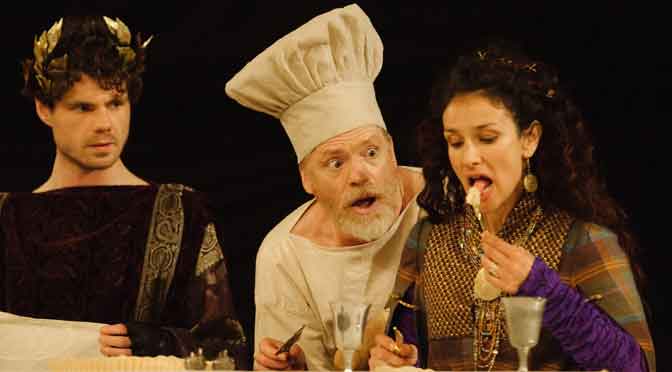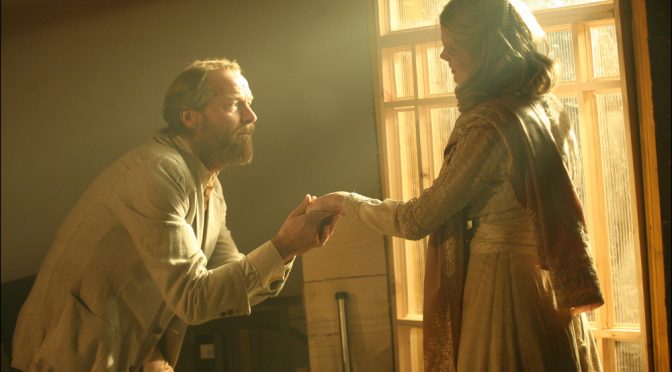An exciting new season at Shakespeare’s Globe is now under way and the first show to recommend is a revival of Lucy Bailey’s 2006 production of Titus Andronicus. Shakespeare’s most brutal play, notorious for its gruesomeness, shows mankind’s bloodlust within a society driven by violence and revenge. Bailey’s direction is appropriately bold and uncompromising; creating engrossing theatre that is – often literally – close to the bone and not for the faint hearted.
Bailey uses the Globe better than anyone I’ve seen. Working with designer William Dudley, the back of the stage is sheathed in black material, creating a kind of architectural void that reminded me of Anish Kapoor, while a temporary roof of panels makes the space claustrophobic and helps contain an awful lot of smoke. While the tent-like construction doesn’t stop the rain, don’t pity the ‘groundlings’ who stand in the pit too much – this is a great show for them, confirming the £5 tickets as the best bargain in London.
The whole audience finds itself in an arena, appropriate for the political machinations in the play and reminiscent of gladiatorial conflict, with the groundlings pushed and pulled as platforms for speeches are wheeled around. You’re conscious of the crowd and see how Bailey has used the audience as a part of the play – it becomes voters, spectators, even a forest.
The cast members know they are in a hit and their energy is fantastic. William Houston is a grand Titus, reminding me of a young Oliver Reed. He is truly frightening and manic as his world falls apart. Gravitas is provided by veteran Ian Gelder, who plays Titus’s senatorial brother, and Matthew Needham gives a stand-out performance as the emperor Saturninus. Manipulating him are the Goths: Tamora and her sons, “the pair of cursed hell hounds and their dame”, performed superbly by Indira Varma, Samuel Edward-Cook and Brian Martin.
More praise. As well as creating an all-action atmosphere, Bailey handles the play’s macabre humour with a brave hand. A scene where Tamara and her sons pretend to be goddesses to fool Titus (finally) makes sense and presenting Titus in a chef’s hat in the infamous banqueting scene is so breathtakingly tasteless it’s a stroke of genius. And Obi Abili, who plays Tamora’s menacing lover, gets a surprising number of laughs.
Don’t underestimate how gory this production is. Bailey has created an experience that is pretty overwhelming. Back to those groundlings again: I spotted several faces turn pale at scenes of rape and murder (I saw them because I was looking away myself). Three people passed out and cardboard bowls were stationed at the entrances for the ushers to hand out. So all credit to Bailey for such a powerful production, but a final mention to the staff, many volunteers, who dealt with the (literal) fallout amongst the groundlings so well.
Until 13 July 2014
Photo by Simon Kane
Written 2 May 2014 for The London Magazine


